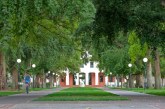 In the world of innovation, I see three possibilities – good ideas, bad ideas, and I don’t get it ideas. In some ways, the UC Davis plan that was unveiled this week fits into all three categories at once.
In the world of innovation, I see three possibilities – good ideas, bad ideas, and I don’t get it ideas. In some ways, the UC Davis plan that was unveiled this week fits into all three categories at once.
Along the same lines, I get that UC Davis does not just want to sit by idly while the state legislature, the Governor and the voters eviscerate funding to higher education, price middle class students out of the UC system and, in general, put our future in jeopardy.
“The goal is to continue creating a university that can sustain its rising trajectory through its own best efforts, leveraging support from the state but rising above the fiscal limitations we now face,” said Chancellor Katehi.
Check.
“Today we find ourselves at a defining moment in our history as a campus. Since you cannot cut your way to greatness, the choice for me is clear,” she continued. “If we develop and expand our campus in a thoughtful and deliberative way, and if we increase the population of highly qualified resident and nonresident students and create an ever-growing endowment fund – as we are doing already – we will have a business model that works. Even in tough times like these.”
“Dealing with state cuts cannot become a long-term strategy for our campus. I have now become convinced that we need to change our course,” she said.
This is where I start to get fuzzy.
I understand that UC Davis has had to weather cuts – huge cuts resulting in the loss of programs, staff layoffs and furloughs, along with huge tuition increases.
The plan here seems to be voodoo economics. The idea is to add 5000 undergraduate students and 300 tenure-track faculty over the next five years.
The tough part is that the additions would be paid for, in part, by an increase in students from outside of California. That is the part of this process that I don’t get.
UC Davis is a good university. But it is only a great deal if you are getting the in-state tuition break. If you are out of state, this costs what a private school costs, except you don’t get the benefits of a private school – you have a huge campus and large class sizes.
UC Davis compares well to other state schools, whether in California or in other states. It doesn’t compare well against schools that charge similar amounts of money.
I also have to take exception to the Davis Enterprise editorial: “While the Davis community once would have been worried about the sudden influx of new residents, we’re ready to embrace the university’s proposed growth with open arms.”
Now if the “we” that she refers to is the Davis Enterprise, I believe that. The paper has almost always supported pro-growth policies and candidates.
But the sentence suggests “the Davis community,” and that I am less certain of.
West Village illustrates the pitfalls of UC Davis growth plans. We are in the process of creating an unincorporated island next to the City of Davis, held hostage by both city and county policies and bickering. They will be among us but not part of us.
We have spoken of the need for UC Davis to be able to house a higher percentage of its students on campus, but a policy that plans for growth of 5000 students, assuming it is attainable, puts pressure on Davis and UC Davis alike to find ways to backdoor growth.
The city has managed to cap growth through Measure J and Measure R. It has thwarted efforts by the county to develop on its periphery through the passthrough agreement, only to see UC Davis build the massive West Village right in its backyard. And to achieve the chancellor’s goals, that project will have to double in size.
You are talking about a city of 10,000 on the boundaries of Davis but that is not part of the city. And the Davis Enterprise thinks the community is ready to embrace that? What part of the community?
Moreover, the notion that innovation will follow growth seems specious.
The Enterprise writes, “Our local economy needs the stimulus that would come with these new residents and employees.”
Our economy does need the stimulus, but I fail to see where the stimulus is coming from. And the city is already taxed to provide services to its existing residennts. Putting more people on the edge of Davis hardly seems like a boon for the local economy.
They continue: “And our existing housing market – both in town and on campus – can handle the first surge of newcomers and be ready for the second wave a few years from now.”
Really? How is that exactly? Where are you going to put 5000 additional undergraduates? Nowhere that I can think of. Moreover, as we know from West Village, simply developing housing is a net drain on resources.
We still haven’t fixed the fiscal and other problems from West Village and now we are talking about more expansion?
Debbie Davis may be ready to embrace growth, but I still have too many questions about how this will work.
The editorial continues: “The growth is designed to help the university accomplish some important goals: give more deserving students the opportunity for a UC education; become financially stable; make the campus more international; support additional faculty; improve campus infrastructure; and boost regional economic opportunity and create new jobs on and off campus.”
This again falls into the “I don’t get it” category. The growth only helps UC Davis if it comes from out of state, so what is going to produce that kind of surge in out-of-state students?
What I see is a lot of rhetoric and hopefulness, but I don’t see right now the policy that is going to make this actually happen.
The Davis Enterprise is jumping on the bandwagon, stating: “What’s good for UC Davis is good for the Davis community. We’re wholeheartedly behind this initiative.”
We’re more skeptical. We see a lot of rhetoric but little in the concrete ability to attract students from out of the state. Growth for growth’s sake is not an innovation tool, it’s simply a hope and a prayer.
We support the efforts of both UC Davis and the City of Davis to bring jobs to the region, but we question how the addition of 5000 students is going to achieve that. Moreover, we worry about residential growth and the cost of providing services to additional residents.
—David M. Greenwald reporting






DG:”West Village illustrates the pitfalls of UC Davis growth plans. We are in the process of creating an unincorporated island next to the city of Davis, held hostage by both city and county policies and bickering. They will be among us but not part of us.
We have spoken of the need for UC Davis to be able to house a higher percentage of its students on campus, but a policy that plans for the growth in 5000 students, assuming it is attainable puts pressure on Davis and UC Davis alike to find ways to backdoor growth.
The city has managed to cap growth through Measure J and Measure R. It has thwarted efforts by the county to develop on its periphery through the passthrough agreement, only to see UC Davis build the massive West Village right in its backyard. And to achieve this, that project will have to double in size.”
The problems here are the unintended consequences of local growth restrictions forcing the University to go their own way beyond the reach of local anti-growth sentiments not the other way around,
Of course there is another solution more taxpayer support.
The question is whether or not you believe that residents should get to determine what their community and city looks like.
What about the water needs for 5000 students +300 faculty families. 🙂
Before rejecting the idea you should look at the opportunity to improve the core of Davis. Draw a circle with the middle at C and Second – one mile in all directions and figure out how to increase utilization of the land. For example, there is a large area dominated by PG&E that is hardly a good use of space near the downtown area. There is also some farm land space on the other side of 80 that might be better used for high density housing- close to downtown and UCD. Most of Davis would remain unchanged as students are added to an area that would be good for downtown, good for the students and good for UCD.
UCD is a major resource of the state. As such, it is absurd to argue for local control, especially when the locals have not only tried to mitigate impacts but have actively opposed growth. As Katahi pointedly noted, enough is enough, threatening to appropriate resources elsewhere. And how long has she been here? I think its two years. Just long enough to formulate a vision and recognize that the obstinate opposition to growth is beyond any measure of realism as perceived by anyone outside of Yolo County.
I am more encouraged by her leadership as time passes. We can now see U.C. obviously made an excellent choice when she was hired.
I think the pro-growth side won’t be happy until we resemble Elk Grove with vacant foreclosures and short sale houses everywhere.
I think the pro-growth side won’t be happy until we resemble Elk Grove with vacant foreclosures and short sale houses everywhere.
Very thoughtful article, which does point to some positives and possible negatives in regard to the UCD Chancellor’s vision. Some points I would like to make:
I am very concerned that the university may be headed in the direction of courting out of state/out of country students at the expense of in-state students. This flies in the face of what the university’s primary focus is supposed to be (besides research of course) – educating Californians.
Educating out of country students has already had some unsettling effects to our own economy. We are educating foreign students, who return to their own countries with our research/technology, and set up competing businesses that undercut our own companies in this country. Is this really a wise policy? And remember, often wealthy foreigners give generously to colleges/universities when it comes to endowments, etc. but perhaps not for the best of reasons. Remember the Bin Laden family/Harvard fiasco?
[quote]UC Davis is a good university. But it is only a great deal if you are getting the in-state tuition break. If you are out of state, this costs what a private school costs, except you don’t get the benefits of a private school – you have a huge campus and large class sizes.
UC Davis compares well to other state schools, whether in California or in other states. It doesn’t compare well against schools that charge similar amounts of money.[/quote]
I completely disagree with this statement. Going to a large university has some distinct advantages, if a large campus doesn’t bother you. The resources are usually much more extensive at a large college. I can remember, when I attended the second largest campus in the country – U of MD, College Park, our physics professor was doing a project involving the University’s cyclotron, and was one of the most knowledgeable and best professors I ever had. Their computer department had two huge computers – an IBM and Univac, with a room full of teletypes. They had one of the best Marching Bands in the country, as well as one of the best jazz bands. A good state university often has resources that smaller colleges just cannot replicate/do not have the resources for.
Very thoughtful article, which does point to some positives and possible negatives in regard to the UCD Chancellor’s vision. Some points I would like to make:
I am very concerned that the university may be headed in the direction of courting out of state/out of country students at the expense of in-state students. This flies in the face of what the university’s primary focus is supposed to be (besides research of course) – educating Californians.
Educating out of country students has already had some unsettling effects to our own economy. We are educating foreign students, who return to their own countries with our research/technology, and set up competing businesses that undercut our own companies in this country. Is this really a wise policy? And remember, often wealthy foreigners give generously to colleges/universities when it comes to endowments, etc. but perhaps not for the best of reasons. Remember the Bin Laden family/Harvard fiasco?
[quote]UC Davis is a good university. But it is only a great deal if you are getting the in-state tuition break. If you are out of state, this costs what a private school costs, except you don’t get the benefits of a private school – you have a huge campus and large class sizes.
UC Davis compares well to other state schools, whether in California or in other states. It doesn’t compare well against schools that charge similar amounts of money.[/quote]
I completely disagree with this statement. Going to a large university has some distinct advantages, if a large campus doesn’t bother you. The resources are usually much more extensive at a large college. I can remember, when I attended the second largest campus in the country – U of MD, College Park, our physics professor was doing a project involving the University’s cyclotron, and was one of the most knowledgeable and best professors I ever had. Their computer department had two huge computers – an IBM and Univac, with a room full of teletypes. They had one of the best Marching Bands in the country, as well as one of the best jazz bands. A good state university often has resources that smaller colleges just cannot replicate/do not have the resources for.
The pro-growth side generally are those with an economic and/or ego stake in UCD business. Everyone asks “what’s in it for me”. The city has been unable to adequately exploit the economic benefits of the research arm of the university. As such, there is nothing in the vision that benefits the majority of Davis residents. There is a competing vision for a smaller and leaner college that better exploits research as a revenue source to offset tuition costs to local students. Here exists opportunities for economic development partnership between UCD and the city. The UC system has not demonstrated it can leverage economies of scale. Operation costs per student climb as more students are added.
The pro-growth side generally are those with an economic and/or ego stake in UCD business. Everyone asks “what’s in it for me”. The city has been unable to adequately exploit the economic benefits of the research arm of the university. As such, there is nothing in the vision that benefits the majority of Davis residents. There is a competing vision for a smaller and leaner college that better exploits research as a revenue source to offset tuition costs to local students. Here exists opportunities for economic development partnership between UCD and the city. The UC system has not demonstrated it can leverage economies of scale. Operation costs per student climb as more students are added.
“Educating out of country students has already had some unsettling effects to our own economy. We are educating foreign students, who return to their own countries with our research/technology, and set up competing businesses that undercut our own companies in this country. Is this really a wise policy?”
You think if the don’t go here they won’t go elsewhere? Having international students subsidize our students also reduces our balance of trade deficit. Its a twofer. Of course we want them to buy our bonds but you don’t want to foster international cooperation through education. What would you prefer? A trade war, protectionism?
“What would you prefer? A trade war, protectionism?”
I would prefer that we educate our own kids first and if after that there’e room for foreign students then and only then can they take up a spot.
“I would prefer that we educate our own kids first and if after that there’s room for foreign students then and only then can they take up a spot”
How do you propose mitigating for the fact that we are pricing our middle class students out of the UC system ?
Easy Rusty, all you need to do is raise taxes enough to pay for it.
[quote]I would prefer that we educate our own kids first and if after that there’e room for foreign students then and only then can they take up a spot.[/quote]
Bingo!
[quote]How do you propose mitigating for the fact that we are pricing our middle class students out of the UC system ?[/quote]
And that is the million dollar question (pardon the pun!)! UC Davis and other public university systems are struggling to survive. The state needs to get its priorities straight.
[quote]Easy Rusty, all you need to do is raise taxes enough to pay for it.[/quote]
Even if the state raised taxes, there is no guarantee the money would go where it should – towards providing a college education for in-state students. Even if the tax revenue raised were to go to the public universities, there is no guarantee the tax revenue would go towards making sure in state students are the primary focus of education.
Correction: …primary focus of a public university education.